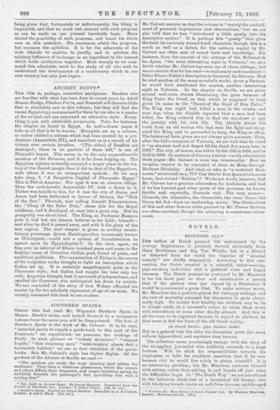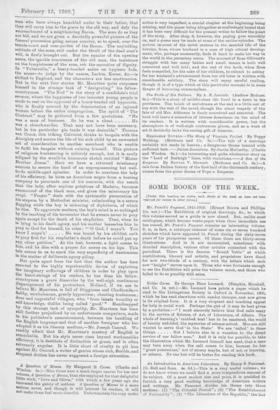NOVELS.
BROTHERS ALL.*
THE notion of Dutch peasant life entertained by thi average Englishman is probably derived ultimately froth Hans Breitmann and Rip Van Winkle, but in' a diluted or distorted form for which the vagaries of "musical comedy" are chiefly responsible. According to this con:. vention, the Dutch peasant is a cheerful, sabot-wearing, pipe-smoking individual with a guttural voice and baggy trousers. The Dutch peasant as portrayed by Mr. Maartens is for the most part so dour and unattractive a person that if the picture were not signed by a Dutchman' it would be pronounced a gross libel. To make matters worse, Mr. Maartens has a positive genius for unhappy endings, stud the rate of mortality amongst his characters is quite abnor mally high. No matter how healthy the children may be, he is always ready at a moment's notice to smite them down with convulsions or some other deadly ailment. And this ie all the more to be regretted because in regard to children he does seem to feel the force of the old Greek Raying :
nb wawa Osgoicri, xdpa $suoi'ety &mai?.
But as a general rule the older his characters grow, the more callous, hypocritical, and repulsive they become.
The collection opens promisingly enough with the story of the struggling journalist who suddenly succeeds to a huge fortune. Will he shirk his responsibilities towards his employees, or belie his confident assertion that if he ever became rich he would live solely to please himself P It is an interesting problem ; but Mr. Maartens contents himself with setting rather than solving it, and breaks off just when the difficulties begin. In " The Death Way" we are introduced to the laborious death-bed of a tyrannical old farmer, who with his dying breath exacts an oath from his sons, middle-aged
• Brothers All: More Stories of Dutch Peasant Life. By Maarten Maarten. London: Methuen and Co. [Cs.] men who have always knuckled under to their father, that they will carry him to the grave by the old way, and defy the encroachment of a neighbouring Baron. The eons do as they are bid, and we are given a decidedly powerful picture of the funeral procession going across country, so to speak, over the tennis-court and rose-garden of the Baron. The unyielding attitude of the sons, still under the thrall of the dead man's will, is finely brought out. But the squalor of the opening scene, the ignoble truculence of the old man, the insistence on the lumpishness of the sons, rob the narrative of dignity. In" Tuberculin," a heavy-handed satire on hygienic fads, the scene—to judge by the names, Larkin, Keene, &c.—is shifted to England, and the characters are less unattractive. But in the next four stories Mr. Maartens quite surpasses himself in the strange task of "denigrating" his fellow- countrymen. "The Nod " is the story of a candidate's trial sermon, where the happiness of two innocent young people is made to rest on the approval of a hoary-headed old hypocrite, who is finally coerced by the denunciation of an injured woman before the entire congregation. The spirit of " The Contract" may be gathered from a few quotations. "He
was a man of business. So he was a cheat He was a churchwarden. That may not have been necessary, but in his particular gin trade it was desirable." Thomas van Crook, this bilking Calvinist, thinks to bargain with the Almighty and secure the life of his sick child by an unwonted act of consideration to another merchant who is unable to fulfil his bargain without ruining himself. This picture of religious huckstering is unlovely enough, but it is easily eclipsed by the would-lie humorous sketch entitled "Mister Brother Jonas." Here we have a returned missionary anxious to secure the hand of an unprepossessing but well- to-do middle-aged spinster. In order to convince the lady of his efficiency, he hires an American negro from a touring company to personate one of his converts, with the result that the lady, after copious potations of Madeira, becomes enamoured of the black man, and gives the missionary his conga. "Prayer" deals with the systematic persecution of his stepson by a Methodist minister, culminating in a severe flogging while the boy is sickening of diphtheria, of which he dies. To aggravate matters, the boy's mind is so unhinged by the teaching of his tormentor that he swears never to pray again except for the death of his stepfather. Then, when he le lying in his death agony, and his mother beseeches him to
pray to God for himself, he cries : "' 0 God, I mayn't. You
know I mayn't.' He was bound by his childish oath to pray first for his stepfather's death before be could put up any other• petition." At the last, however, a light comes to him, and he dies with a prayer for mercy on his lips. This tale seems to us to mark the very superfluity of wantonness in the matter of deliberate agony-piling.
But quite apart from the fact that the author has here resorted to the highly reprehensible device of exploiting the imaginary sufferings of children in order to play upon the heartstrings of his readers, he has done his fellow- Countrymen a grave disservice by the well-nigh continuous disparagement of his portraiture. Holland, if we ar•e to believe Mr. Maartens, is full of Stigginses and Chadbands,— flabby, unwholesome, greedy hypocrites; cheating tradesmen ; dour and ungrateful villagers, who, " from innate humility or
self-knowledge, dislike being 'called 'good.' " Handicapped by this strange lack of sympathy, Mr. Maartens has been still further prejudiced by an unfortunate comparison, made in his publisher's announcement, between his handling of the English language and that of another foreigner who has
adopted it as his literary medium,—Mr. Joseph Conrad. We readily admit that Mr. Maartens's mastery of English is remarkable.. But his style never rises beyond workmanlike efficiency, it is destitute of distinction or grace, and is often extremely angular. It is little short of cruelty to pit him against Mr. Conrad, a writer of genius whose rich, flexible, and eloquent diction has never suggested a foreign extraction.










































 Previous page
Previous page